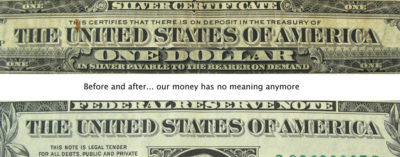Money Mistakes
This is not nit-picking. I am not interested in replacing the Fed with something as bad or worse. The problem with the Fed is not that it isn’t socialistic enough. The problem with the Fed is that it is a creation of Congress and operates with special privileges granted by the government. If only the Fed weretruly private, with no government-granted privileges. Then it could do no damage whatever.
As I also noted, I recently asked an antagonist on Facebook to write out his ten propositions on money, so we could try to get to the bottom of our differences. I posted them last week.Right now I’ll reply to this one:
“Monetary deflation benefits the private bankers who wish the People to default in order to seize collateral with, or without govt force.”
This is clearly incorrect. In addition to not wanting the hassle of trying to unload collateral in a potentially illiquid market, no bank would want to seize collateral during a deflationary period at all! When asset prices are falling, why would banks want to grab assets? Who would want an asset that’s in the middle of seeing its price fall?
Ah, but couldn’t the banks coordinate the deflation together, and then when it hits bottom, grab all the assets at that moment, when their prices have nowhere to go but up? Even assuming that bankers would adopt such a far-fetched strategy, there is no way for them to know at what point in the deflationary process the defaults are going to occur.
If there’s something we’re supposed to fear from banks, this sure ain’t it.
What’s also peculiar about this assertion is how tone-deaf it is to the financial world we live in. The remotest prospect of deflation is treated, without fail, as an unthinkable catastrophe by absolutely everyone in the financial world — the financial media, the financial elites, everyone. Once in a great while they may caution about inflation, but those cautionary words, when they are uttered at all, are always restrained and mild. But deflation? Scarcely a single voice can be heard, anywhere, in support of it.
Thus my critic, who claims I am really just a Rothschild shill (Rothschild evidently being in favor of a free market in money, and the absence of a central bank), is actually joining his voice with the entire financial establishment in raising warnings about deflation, of all things. Think back to the word “leverage” from the recent financial crisis and you will understand why the financial elites are desperate for inflation, and would see the whole world burn down before consenting to deflation.
We are constantly warned about deflationary spirals (if prices are falling, no one will buy, which will make prices fall even more, and then people will be even less willing to buy if they anticipate still further falls in price, etc.), about the alleged impossibility of business profits under deflation, etc. I answered these arguments in a recent lecture in New York.
For more on deflation, see the relevant section of my 2011 book Rollback(which could very well have been called Everything Should Be Abolished), as well as the deflation section of my LearnAustrianEconomics.comresource.
By Tom Woods
Read the original article at TomWoods.com. http://tomwoods.com/money-mistakes/












